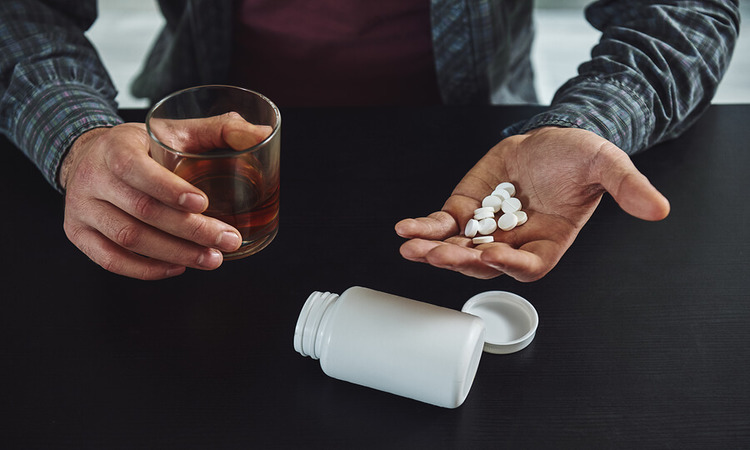
Benzodiazepines, commonly referred to as “benzos,” to depressant the nervous system (CNS). They are commonly used to treat anxiety, seizures, and sometimes alcohol withdrawal. Alcohol is also a CNS depressant, and under no circumstances is it considered safe to combine these two substances.
Effects of Benzos and Alcohol
Alcohol, when used alone, can lead to several adverse effects, including the following:
- Slurred speech
- Depression
- Anger and aggression
- Impaired coordination
- Memory loss (blackouts)
- Nausea and vomiting
- Irregular or slow breathing
- Elevated heart rate
Drinking alcohol for a prolonged period and in excess can result in many health conditions, including liver disease, heart arrhythmia, pancreatitis, hypertension, and an increased risk of several forms of cancer.
Benzos are prescription drugs and should only be used as directed by a health provider. Popular brands include Xanax, Klonopin, Ativan, and Valium. Misuse, including using them too frequently or in doses in excess of the prescription, can lead to side effects, which may include the following:
- Drowsiness or sleepiness
- Blurred vision
- Slurred speech
- Memory impairment
- Impaired concentration
- Headache
- Impaired coordination
- Loss of appetite
- Vomiting
- Sleep disturbances
It’s important to notice that symptoms of alcohol abuse tend to overlap with those of benzo abuse. This overlap occurs because benzodiazepines and alcohol are both depressants and affect the CNS in similar ways.
It is certainly possible to use either one of these substances responsibly. As noted, however, the two should never be combined, even when a person has a legitimate prescription for a benzo and is using the medication as directed. Their combined use can rapidly amplify the effects of each other, which significantly increases the risk of serious health complications, overdose, hospitalization, and death.
Dangers of Mixing Benzos and Alcohol
As we have established, one of the biggest dangers associated with benzos and alcohol use is that they are both depressants and are very effective as such. Benzos, when used in prescription doses, can reduce CNS activity, and therefore help those who experience anxiety or seizures to function more normally. A standard drink or two of alcohol may also ease a person’s anxiety or induce relaxation and even cause a bit of drowsiness.
However, when used in conjunction, CNS depressants can cause profound sedation as well as perilously slow respiration and heart rate. Moreover, when these two substances are consumed even in relatively small amounts, the overall compounded effect can lead to many dangers and health risks. Because these two substances have similar depressant effects, it’s not unlike drinking more alcohol than one actually did or taking a double or triple dose of a benzo medication.
If either substance is abused, a person may experience extreme drowsiness, severely impaired coordination, and be at an increased risk of having a serious fall or injury. The combined effects also cause the person to become unresponsive and ultimately lead to coma, brain damage, or death.
Depressed or labored breathing that can result from using these substances has the potential to be deadly. When this occurs, the person is not receiving enough oxygen, and even if he or she survives, brain damage may result. One hallmark symptom of a lack of oxygen is pale, clammy skin that is bluish around the lips or under the fingernails. If an emergency medical intervention is not performed, the person is at high risk for respiratory arrest and death.
Treating Alcohol Withdrawal with Benzodiazepines
When a person is trying to recover from alcoholism, a health provider may prescribe a benzodiazepine, such as Klonopin or Ativan. This is done to prevent specific symptoms of withdrawal, such as anxiety and seizures. The temporary use of such medication can make a person’s transition away from alcohol addiction safer and more comfortable.
Benzodiazepines are not really intended for long-term use, however, as they do have a high potential for abuse and addiction. For this reason, a physician who oversees a patient needs to watch for signs of an emerging chemical dependence. The development of a new addiction to a substance that induces effects similar to alcohol is especially dangerous if the person relapses and combines these two substances.
Help for Alcohol or Benzodiazepine Addiction
Those who struggle with polysubstance abuse are urged to seek professional help as soon as possible. If these conditions are left unaddressed, a person may continue to increase their use and leave themselves open to the possibility of an ever-worsening substance abuse problem or even death.
Addiction specialists generally regard comprehensive addiction treatment as the most effective way to treat polysubstance use disorders. Emotional support from therapists, counselors, and peers can help clients to examine the factors that led to their substance abuse issues. In doing so, they can begin to develop better mechanisms for coping with stress, triggers, and cravings to use substances.
Recovery By The Sea is a specialized treatment center that is committed to helping clients achieve abstinence and sustain long-term sobriety. Through psychotherapy, counseling, and group support, we aim to provide them with the tools they need to prevent relapse and make better decisions surrounding their health and well-being.
If you are ready to reclaim your life, call us today to discuss treatment options and begin your journey to recovery!
READ THIS NEXT: The Dangers of Combining Oxycodone and Alcohol